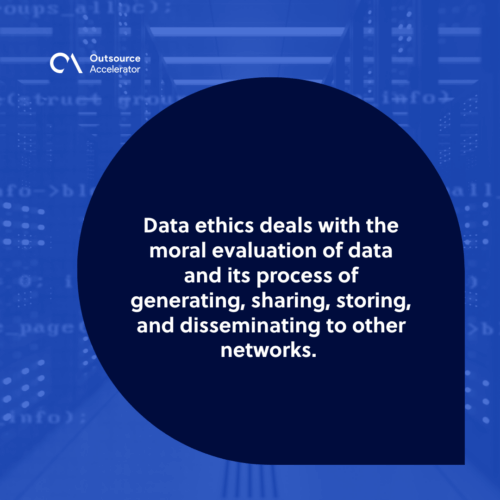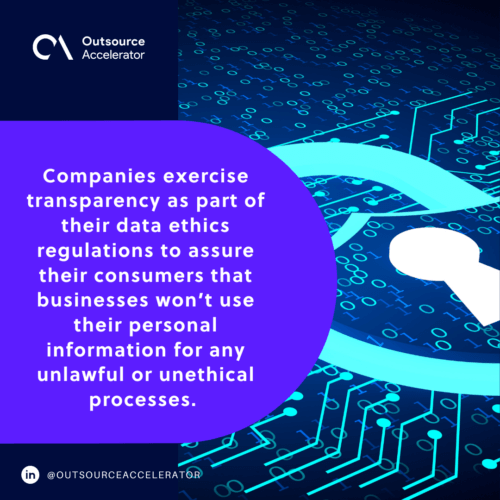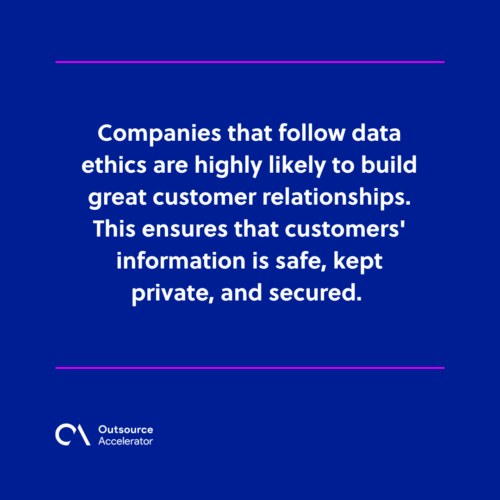Data ethics and its role on businesses

Have you ever wondered how other businesses successfully target their market through advertisements?
The real deal is companies track their customer’s online activity to offer their services through targeted ads. They also use and monitor their data to convince them to purchase further, resulting in increased revenue.
However, customer data must be handled appropriately and carefully considered. Information can be highly confidential, and using it carelessly can lead to serious cybersecurity issues that negatively impact a business.
Practicing data ethics is vital in safekeeping the personal information of users in an age where companies are heavily relying on online presence.
We will be talking about data ethics and its role in businesses in this article.
What is data ethics?
As a new branch of ethics, data ethics deals with the moral evaluation of data and its process of generating, sharing, storing, and disseminating to other networks.
According to Harvard Professor Dustin Tingley, data ethics asks, “Is this the right thing to do?” and “Can we do better?” in managing data stored in a system.
Data ethics is more than gaining consent to use a user’s data. It is about how their data will be handled morally by a network. It helps maintain the safety of both users and programmers despite the prevalence of cyber issues and data hacking.
Businesses practice data ethics, mainly when they utilize algorithms to reach their target market effectively. A framework concerning ethical data policies must be implemented, specifically in tech innovations and web analytics.

Why is data ethics important?
The importance of data ethics mainly lies in the welfare of consumers and Internet users. It establishes the limitations of companies in controlling the data they collect from people to avoid immoral practices.
While it still allows businesses to gather information from online users to boost their market performance, data ethics also addresses their unexposed personal identity and avoids the endangerment of safety.
Data ethics also takes importance in protecting users against social issues such as racism and human trafficking.
Principles of data ethics
Data ethics observe the following regulations:
Ownership
No other entity should control data than the one who owns it.
Individuals should have primary control over the utilization of their data and actively monitor how systems process and activate them. Human beings will always have the principal advantage of data procuring.
Any act of personal data collection without proper consent is considered illegal and unethical. To gain one, companies can use signed written agreements, privacy policy checkboxes, and pop-ups with the “accept cookies” option for their customers.
Transparency
Companies exercise transparency as part of their data ethics regulations to assure their consumers that businesses won’t use their personal information for any unlawful or unethical processes.
They can transmit transparency reports that contain how their customers’ data is used and what networks will benefit from them. An example of this is Google’s Transparency Report.
Additionally, transparency in data ethics also covers the understanding of individuals’ potential risks and threats in providing their information to businesses.

Privacy
Data handling also comes with the responsibility of respecting subjects’ privacy. Even when a customer allows a company to use his data for analysis, limitations are still implemented, especially when it’s their personally identifiable information (PII).
Another responsibility of businesses is the protection of their customer’s private information. When they collect data for competitive gains, it’s imperative to own a secured database that third-party entities can’t easily access.
Accountability
Ethics in itself takes importance on accountability. This also applies to data ethics.
In this principle, companies reflect on their intentions regarding the data they process and how these affect their short and long-term goals.
Before pushing through with the data-gathering process, it is important to discern whether the users will benefit from the procedure or not. Any outcome of the process also holds the gatherer or the business accountable.
Outcomes
The last principle that data ethics considers is the outcome of the data companies collects. Careful deliberations are done to ensure that results won’t mean any harm to its subjects.
However, even when they intend to gather data for good reasons, the results of the analysis can still endanger its users, especially when mishandled. This falls under the disparate impact or unintentional discrimination acts by systems or regulations.
Businesses must always follow data ethics policies to avoid these circumstances.
Advantages of data ethics
Data ethics not only protect online users’ welfare and allow firms to have the following advantages.
Building trust
Companies that follow data ethics are highly likely to build great customer relationships. This ensures that customers’ information is safe, kept private, and secured.
Established customer trust allows companies to boost their reputation and brand value. They are also more likely to remain loyal to their service offerings.

Practicing fairness
Company bias is inevitable at some point when they only handle it for their benefit. Data ethics refrains this from happening and promotes fairness in companies’ decision-making and analysis of data processes.
Data privacy compliance
Laws concerning the data privacy of users are implemented globally. Data ethics guarantees that they rightfully exercise ethical policies on their operations and processes.
In this way, online users understand that the authorities also protect their private information.
Prioritize users’ online safety through data ethics
The broad utilization of technology in companies is acknowledged worldwide. While online users give consent to track their online activities, organizations should still abide by a set of regulations and prioritize their safety.
Fortunately, data ethics promote this objective. This redefines the web space into a much safer area for companies and individuals.
It provides a win-win situation for parties–online activities with fair treatment, assured safety, and without worry.







 Independent
Independent




